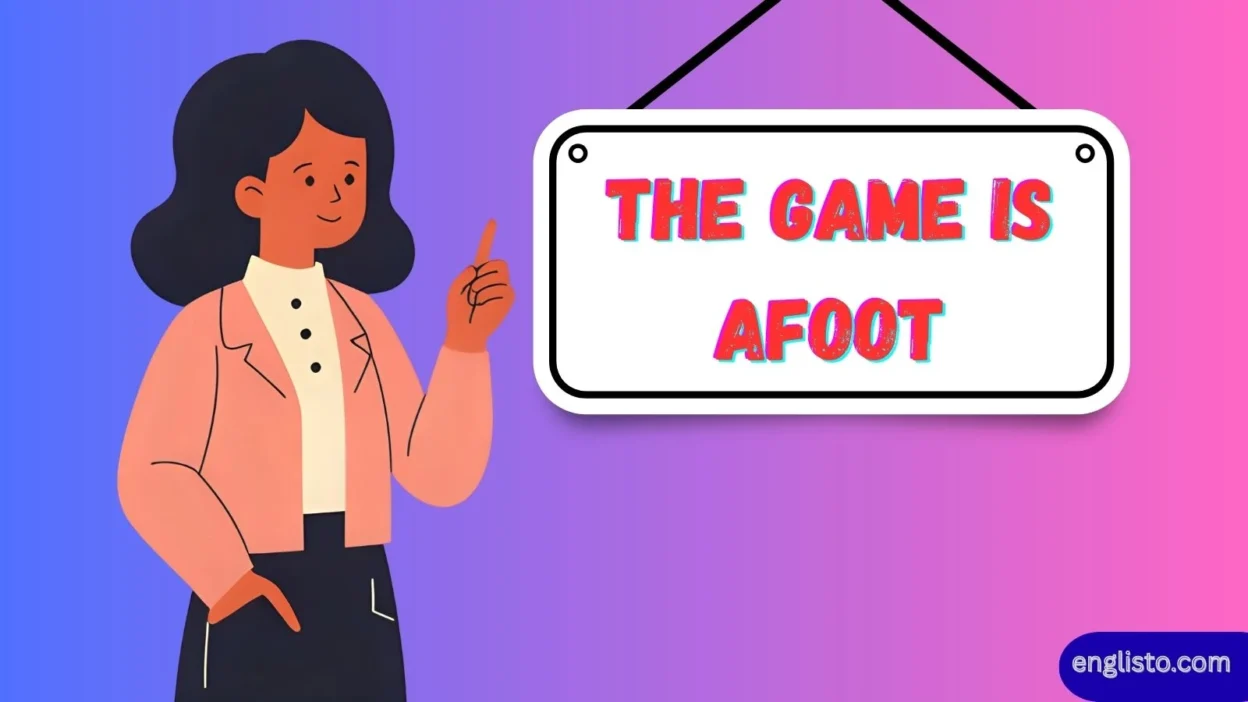Every so often, a phrase from centuries past slips seamlessly into modern conversations, headlines, and even pop culture catchphrases. One such phrase is “The Game Is Afoot.” If you’ve watched Sherlock Holmes adaptations, read Shakespeare, or even caught a sports commentator hyping up a match, chances are you’ve heard it. But what does it actually mean? Where did it come from, and why has it survived for more than 400 years?
This article unpacks the meaning, history, literary origin, and cultural relevance of “The game is afoot” — tracing its journey from Shakespeare’s stage to Sir Arthur Conan Doyle’s detective stories, and even into everyday English idioms.
What Does “The Game Is Afoot” Mean?
At its core, “The game is afoot” means “something has begun,” usually with a sense of urgency, anticipation, or excitement.
Think of it as the old-fashioned equivalent of:
- “The game is on.”
- “So it begins.”
- “Challenge accepted.”
It signals that a process, adventure, or situation is underway and active.
Example Sentences
- “With the new project finally approved, the game is afoot.”
- “Detective Jones looked at the crime scene and whispered, The game is afoot.”
- “As soon as the whistle blew, the players knew the game was afoot.”
The Shakespearean Origin of “The Game Is Afoot”
The phrase dates back to William Shakespeare, the legendary English playwright often called “the Bard.”
It first appears in Henry IV, Part 1 (1597) and again in Henry V (1599). In Shakespeare’s time, the word “afoot” meant “in motion” or “underway.”
Shakespeare used the phrase to rally troops, inspire courage, and signal action.
The Phrase in Henry IV and Henry V – Shakespeare’s War Cry
In Henry IV, Part 1 (Act V, Scene II, line 59), Shakespeare writes:
“Before the game is afoot, thou still let’st slip.”
Here, the phrase refers to hunting with greyhounds, when the dogs were released as soon as the chase began.
Later, in Henry V (Act III, Scene I), during the famous Siege of Harfleur speech, King Henry cries out:
“The game’s afoot: Follow your spirit, and upon this charge
Cry ‘God for Harry, England, and Saint George!’”
This was no mere hunting metaphor. It became a battle cry, stirring soldiers with imagery of blood, sinews, and valor.
Shakespeare’s words framed “the game is afoot” as a signal of action, combat, and heroic struggle.
Sir Arthur Conan Doyle and Sherlock Holmes Popularization
Centuries later, Sir Arthur Conan Doyle revived the phrase in his Sherlock Holmes stories. Holmes, the world’s most famous detective, often exclaimed:
“The game is afoot!”
He used it when a new case began, echoing Shakespeare’s sense of urgency — but with the detective’s intellectual hunt for clues rather than soldiers charging into war.
Notable appearances include:
- The Adventure of the Abbey Grange
- The Adventure of the Blue Carbuncle
- The Adventure of the Speckled Band
Holmes’ use turned the phrase into a signature line — one that actors like Basil Rathbone, Jeremy Brett, Robert Downey Jr., and Benedict Cumberbatch delivered with their own flair.
Figurative vs. Literal Meanings
The phrase works on two levels:
| Type | Meaning | Example |
| Literal | A hunt, chase, or competition has physically begun. | “The football match kicked off; the game is afoot.” |
| Figurative | A situation, case, or challenge is underway. | “With the new election cycle, the political game is afoot.” |
This dual use is why the phrase survives: it’s flexible in meaning, both in serious contexts (war, investigation) and in lighthearted situations (sports, games, TV shows).
Synonyms and Related Phrases
Here’s a quick synonym table for “The game is afoot”:
| Synonyms | Modern Equivalents |
| The game is on | Challenge accepted |
| The hunt is begun | Bring it |
| The chase is underway | So it begins |
| The process is active | Game on |
| The situation is moving | The action has started |
Antonyms:
- The game is over
- The play is done
- The situation is ended
Real-Life Examples of the Phrase in Action
- Journalism: The New York Times once used it in a headline about political primaries: “With Florida votes looming, the game is afoot.”
- Sports Commentary: During NFL playoffs, analysts often echo it to hype up fans.
- Pop Culture: Films like Sherlock Holmes (2009) and shows like Elementary (with Jonny Lee Miller and Lucy Liu) use it repeatedly.
- Everyday Speech: “Now that the semester has started, the game is afoot.”
Usage in Literature, Journalism, and Media
The phrase is a journalistic favorite because it conveys urgency without cliché. Publications like the Orlando Sentinel, Boston Globe, and Chicago Sun-Times have used it to describe politics, business, and sports.
Authors from Mark Twain (The Adventures of Tom Sawyer) to modern critics have played with it. Even advertisements and comics have recycled the phrase, proving its versatility.
The Phrase in Modern Entertainment (TV, Film, Sports)
From Pac-Man arcades in the 1980s to Disney’s Enola Holmes, the phrase has popped up in surprising places:
- Film: Sherlock Holmes (2009) with Robert Downey Jr. dramatically revives the line.
- Television: BBC’s Sherlock (Benedict Cumberbatch) gave it a 21st-century twist.
- Sports: Used by commentators during the Ashes cricket series and NFL games.
- Pop Culture: Even Saturday Night Live parodies have played with the line.
Idiomatic Analysis: Grammar and Function in Sentences
Grammatically, “The game is afoot” follows a simple subject + linking verb + predicate adjective structure.
- The game = subject
- is = linking verb
- afoot = predicate adjective (meaning in motion, active)
Phonetic IPA: /ə-ˈfu̇t/
In Middle English, “afoot” came from afoten — literally “on foot.”
Synonym & Antonym Tables for Quick Reference
Synonyms Table
| Expression | Context |
| The chase is on | Detective fiction |
| The process is underway | Business, projects |
| The match has started | Sports |
| The case is active | Legal/criminal investigations |
Antonyms Table
| Expression | Context |
| Game over | Sports, casual |
| The play is finished | Theater, performance |
| The case is closed | Detective/legal |
The Cultural Longevity of “The Game Is Afoot”
Why has this phrase endured for over four centuries?
- Literary power: Shakespeare’s mastery embedded it in English drama.
- Detective fiction: Conan Doyle gave it a second life through Sherlock Holmes.
- Cultural versatility: Works in war, sports, politics, and everyday speech.
- Media adoption: Journalism and TV keep refreshing it for new audiences.
It’s rare for a phrase from the 1500s to remain not just in circulation, but actively popular and evolving.
FAQs
What does “The game is afoot” mean in Shakespeare?
It signaled the start of a hunt or battle, often urging soldiers into action.
Why did Sherlock Holmes say “The game is afoot”?
Holmes used it as a catchphrase to announce the beginning of a new case or investigation.
Is “The game is afoot” still used today?
Yes, it’s common in journalism, sports, detective fiction, and pop culture.
What is a modern equivalent of “The game is afoot”?
Phrases like “Game on,” “Let’s go,” or “So it begins” carry similar energy.
What is the origin of the word “afoot”?
From Middle English “afoten”, meaning on foot, in progress, underway.
Conclusion
From Shakespeare’s battlefields to Sherlock Holmes’ crime scenes, and from sports arenas to political contests, the phrase “The game is afoot” has proven timeless. It signals not just that something has begun, but that it carries excitement, urgency, and anticipation.
Whether in literary history, journalism, or your next office project, when you hear “The game is afoot,” you know one thing for certain: something important is already in motion.



